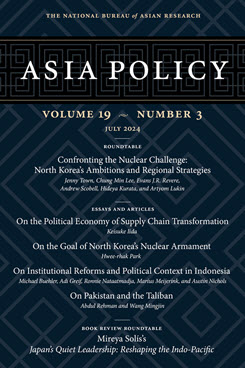Essay in Asia Policy 19.3
Pakistan and the Taliban:
A Strategic Asset Turned Strategic Predicament
This essay examines the factors behind the deteriorating political and security relations of once strategic partners Pakistan and Afghanistan with the return of the Taliban.
Executive Summary
MAIN ARGUMENT
As part of its policy of creating “strategic depth” in Afghanistan, Pakistan spent decades nurturing the Afghan Taliban as a strategic asset—one that would secure its interests in Afghanistan. Hence, the Taliban’s resumption of power in Kabul in August 2021 was initially perceived as a victory for Pakistan. However, Islamabad’s support for the Taliban has backfired, as hostility between Afghanistan and Pakistan has significantly increased since the Taliban regained the reins of government. Since the re-emergence of the Islamic Emirate of Afghanistan, Pakistan’s terrorism problem has resurfaced, the Durand Line issue has once again become an obstacle, and violent clashes along the border have disturbed trade. Pakistan’s strategic asset has turned into a strategic predicament, bringing the two countries almost to the verge of war.
POLICY IMPLICATIONS
- The U.S. withdrawal from Afghanistan and the re-emergence of the Taliban regime in 2021 have resulted in a concerning rise in the presence of terrorist organizations such as Tehrik-i-Taliban Pakistan (TTP), al Qaeda, and the Islamic State Khorasan Province (ISKP). These groups are a threat to international peace and demand attention from all regional stakeholders.
- Both Pakistan and Afghanistan currently face the threat of terrorism. Pakistan is being threatened by the TTP, while Afghanistan is being threatened by ISKP. Kabul and Islamabad would do well to set aside their differences to work together on combating terrorism, their common enemy.
- Pakistan and the U.S. were important partners in counterterrorism efforts in Afghanistan. Though the U.S. has withdrawn from Afghanistan, it is recommended that it consider ways to continue working with Pakistan to fight terrorism and support stability in the region.
Abdul Rehman is a PhD candidate in the School of International Relations and Diplomacy at Beijing Foreign Studies University (China).
Wang Mingjin is a Professor in the School of International Relations and Diplomacy at Beijing Foreign Studies University (China).
About Asia Policy
Asia Policy is a peer-reviewed scholarly journal presenting policy-relevant academic research on the Asia-Pacific that draws clear and concise conclusions useful to today’s policymakers. Asia Policy is published quarterly in January, April, July, and October and accepts submissions on a rolling basis. Learn more


